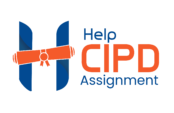7LD03 Designing Learning to Improve Performance
- April 28, 2022
- Posted by: admin
- Category: CIPD Level 7

Order Now
This unit is a learning and development specialised unit for the CIPD Level 7 Advanced Diploma. The unit focuses on creating learning and delivery while considering the organisation’s needs and context. It is intended to provide learners with the knowledge to develop and implement strategic and innovative solutions to help their organisation grow and perform better. This unit will help the learner understand how to do external analysis and create reports to persuade and influence stakeholders. It looks at current and traditional learning design methodologies and models, the various delivery modalities, and the implications of learning transfer across the organisation. It highlights data analysis in learning interventions when designing meaningful and productive learning designs.
What you will learn
This unit will help the learner examine how different contexts and the external environment influence organisational learning approaches. In addition, the learner will examine the development of sound learning methods and policies and critically examine organisational learning approaches in both internal and external environments. As a result, the learner will be equipped with corporate leadership skills and will be able to understand how to lead and manage people. In addition, the learner will evaluate the methods for gathering learning data and their relevance to learning objectives. The learner will also be able to compare and contrast the differences between a learning gap and a development gap. The importance of learning design and delivery and the need for various approaches will be covered in this course. Finally, the learner will discover why impact measurement is important and how learning professionals can help organisations become more aware of impact culture.
This unit is suitable for persons who
| This unit is necessary for the following individuals: | • You have earned the CIPD Foundation Diploma in Human Resource Practice and wish to work in human resources. • Have some experience in the sector but lack professional human resource skills. • Are you a senior people practitioner wishing to broaden and develop your knowledge, skills, and abilities to have a greater impact on strategy, policy, and people? • They desire to get a professional qualification to advance their careers in human resources (HR) and learning and development (L&D) management. • A desire to achieve more autonomy, influence, and judgment to lead and push businesses and employees strategically. |
Learning outcomes
| Learners should be able to achieve the following four primary learning outcomes after finishing this unit. These results are then divided into several sub-categories. The learning outcomes will help them to: | • Recognise how learning is influenced by the external world and the internal organisational context. • Recognise the need for learning needs assessment during the design phase. • Recognise the significance of impact measurement in the educational process. • Recognise the importance of designing and delivering contextualised learning events. |
What are the entry requirements?
The CIPD does not always regulate the legislative requirements institutions have for their candidates. Some of these criteria are unique to each institution, while others apply to all students enrolled in the unit. Institutions have developed these diagnostic tools to determine whether candidates possess the necessary literacy and numeracy skills to complete Designing Learning to Improve Performance (7LD03). Most universities need candidates to have a working knowledge of the English language to enrol in a course. For example, some universities require students to have a C/4 or better in English at the GCSE level. Other universities demand a 6.5 IELTS/ESOL Level 2 equivalent from applicants who speak English as a second language. The CIPD, on the other hand, has a policy for non-native English speakers that outlines appropriate English language entry requirements. According to most schools, applicants should have a bachelor’s degree, CIPD level 5 certificates, and prior human resources experience. Significant strategic people practice experience may be substituted for a degree in extreme circumstances; however, this is subject to review. CIPD recognises previous learning policies that allow learners to demonstrate that they already possess the knowledge, understanding, or abilities required to meet the assessment requirements and do not need to acquire them through a course of study. For learners who have completed units from a previous CIPD certification, the CIPD, for example, has pre-defined transfer opportunities to this unit as scheduled exemptions. Learners who have completed units from non-CIPD qualifications that they believe will map to units in this qualification may submit an application form to the CIPD for verification and accurate mapping and documentation of attainment. Finally, several universities need candidates to be at least 18 years old to participate in a course. The CIPD, on the other hand, recommends that candidates for this unit be at least 21 years old.
How we can help
We are responsible for alleviating your academic stress when you need to write an outstanding essay but do not have time to conduct thorough research on the issue. Students that require assistance with their “Designing Learning to Improve Performance (7LD03)” papers can use our writing services. We created a writing platform based on intellectual capacity with you in mind. We provide a collaborative workspace where smart people work together to help you avoid study headaches, stress, and late nights. We’re a group of highly skilled writers, editors, and proofreaders whose main goal is to make excellent work feasible by removing the stress of doing the tedious labour yourself. Our staff consists of highly qualified specialists that ensure that the research and projects of our clients achieve the highest possible grade. We also believe that you are the only one who truly understands your needs. As a result, our clients can communicate directly with our writers. Plagiarism is not accepted, and each assignment is written from the ground up. We scan each document for uniqueness using licenced software before sending it to verify that it is unique. We pay special attention to how much time and effort is spent on the paper’s research to ensure that it is complete and based on reliable sources. In addition, the work must be thoroughly reviewed to ensure that it adheres to all marking rubrics and reference styles. Our Privacy Policy is flawless, ensuring our writing service’s safety, security, and confidentiality. Our main goal is to ensure that every customer we work with succeeds academically.
Reference
Alizadeh, A., Kurian, D., Qiu, S., & Dirani, K. M. (2021). Ethics, corporate social responsibility and the role of human resource development: the academic experts’ view. European Journal of Training and Development.
Armstrong, M., & Taylor, S. (2020). Armstrong’s handbook of human resource management practice. Kogan Page Publishers.
Carbery, R., & Cross, C. (Eds.). (2018). Human resource management. Macmillan International Higher Education.
Dabbagh, N., Marra, R. M., & Howland, J. L. (2018). Meaningful online learning: Integrating strategies, activities, and learning technologies for effective designs. Routledge.
Howes, C. D. (2018). Creative Collabortion in Higher Education: A Guide for Distance Learning Technologies. Morehead State University.
Lancaster, A. (2019) Driving performance through learning: develop employees through effective workplace learning. London: Kogan Page.
Mulvie, A. (2021). Learning and Development for a Multigenerational Workforce: Growing Talent Amongst Age Diverse Employees. Routledge.
Neelen, M. and Kirschner, P.A. (2020) Evidence-informed learning design: creating training to improve Performance. London: Kogan Page.
Rose, M. (2018). Management: Alternatives, Consequences and Contexts, London: CIPD. Rose, M.(2018) Reward Management: A Practical Introduction, 2nd edn, London: Kogan Page. Human Resource Management, 162.
Sternad, D. (2019). Effective management: Developing yourself, others and organisations. Red Globe Press.
Related Articles:


